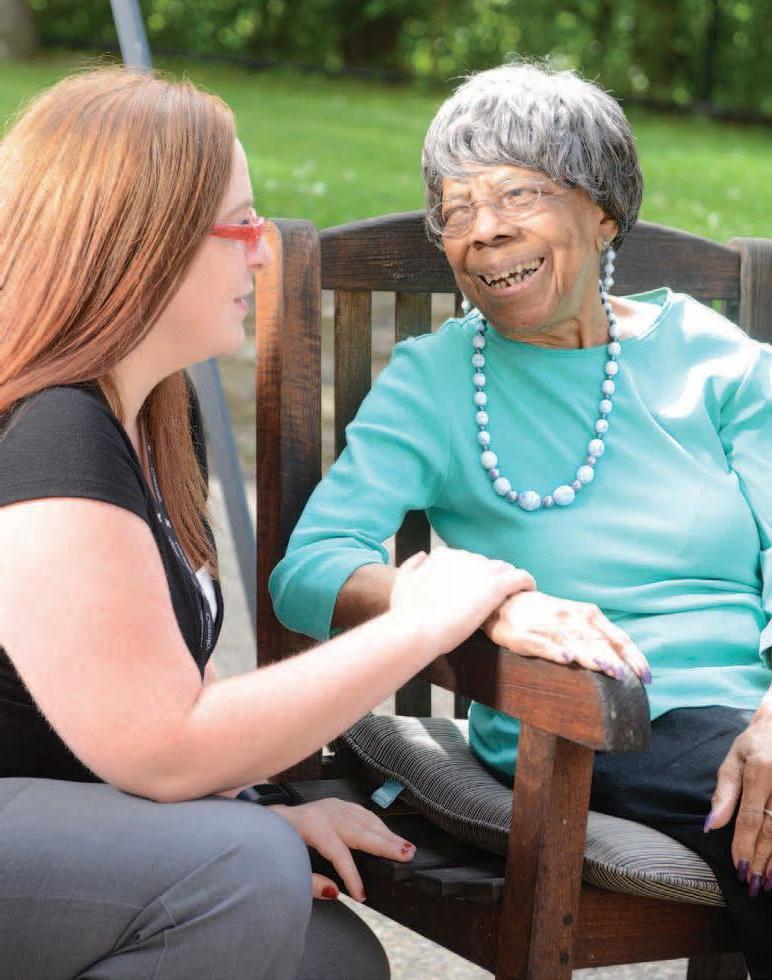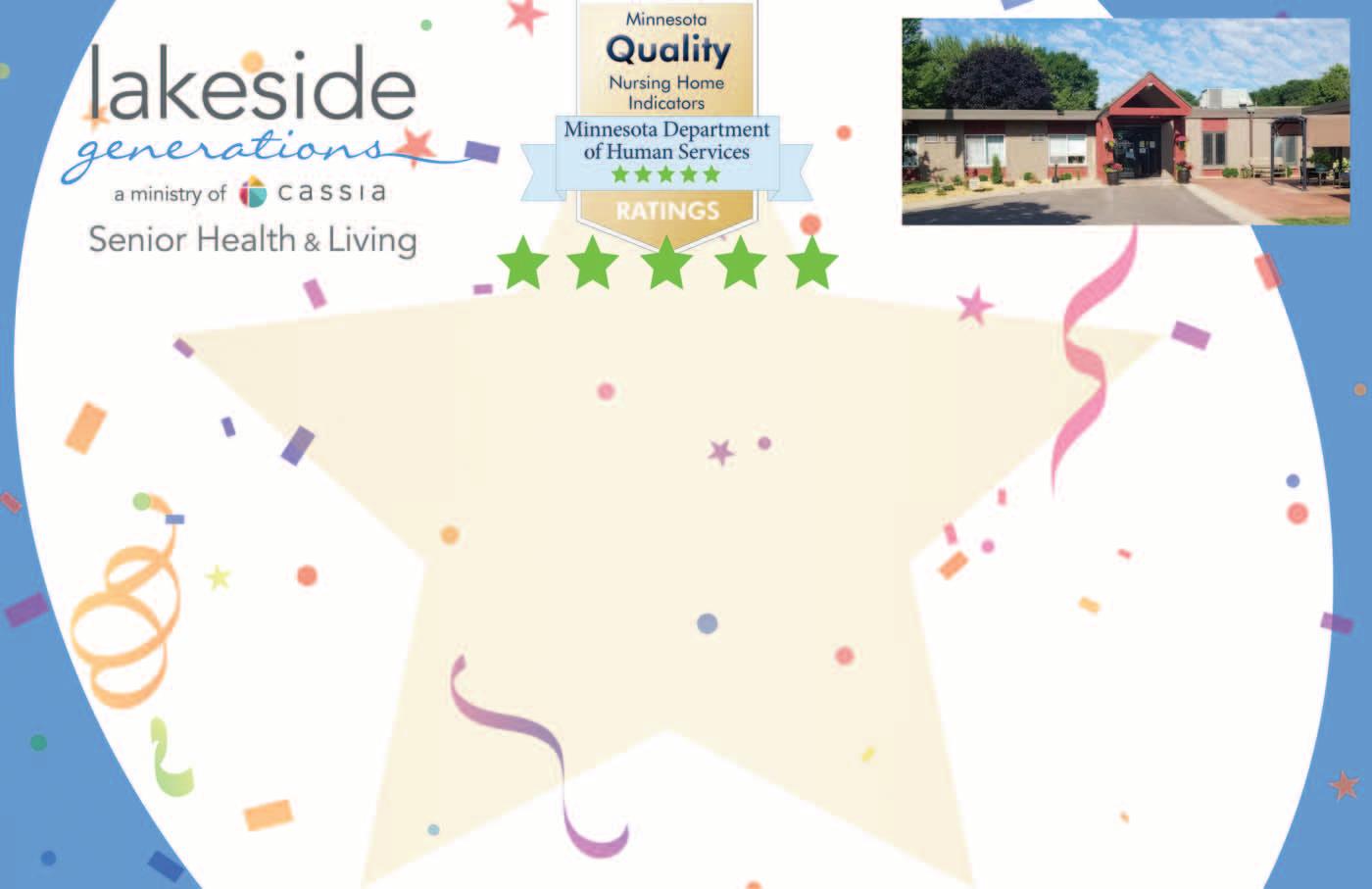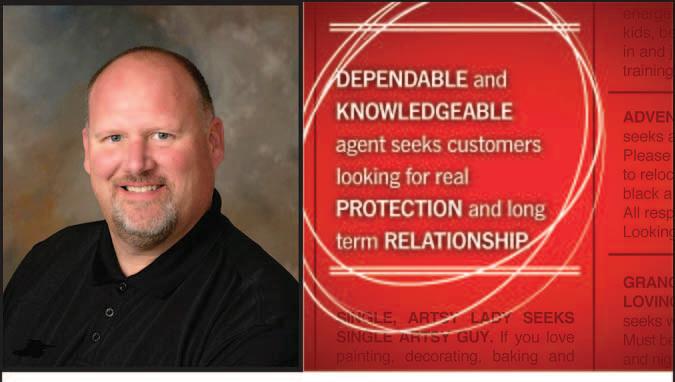
11 minute read
Reflections
Music lifts our spirits in times of trouble
Throughout history, times of crisis have left countless generations lost and afraid and by any reasonable measure, we are living in a time of crisis now. And, like past generations, each of us shares this fear and despair as we trudge onward toward an uncertain future. Yet crisis isn’t entirely bad; it brings opportunity, too, and one thing that has united us during this rotten pandemic, is music.
Advertisement
Music, it seems, has
Mark LEITHEISER
COLUMNIST
been the universal salve to help heal our world, and like most medicines, it takes many different
DIGNITY•INDEPENDENCE•AFFORDABLE•COMFORT•SECURITY


Askaboutour A AmazingMoveInSpecial A NewlyExpanded NewlyRemodeled SeniorIndependentLiving S ApartmentsAvailable A

“ThisChristmas giveyourselfthe giftofComfort andSecurity.” FirstMonth FREERent PlusaMenuof Benefitsto choosefrom*
CALLFORYOURTOURTODAY! 301GlenStSW,Hutchinson•320-234-7588•poprl.org *TermsandConditionsApply forms. We’ve heard children singing and enjoyed free concerts from balconies and street corners. We’ve been treated to free concerts by opera stars as well as country music singers, “Hey y’all, wuz up?” Music, it seems, truly is a universal language that touches each of us, especially in times of need.
Inspired by these musicians, I considered my own musical background to see what I might offer the world. Sadly, I was found wanting. My troubles started in the elementary school choir where I sang soprano while most of the other boys sang tenor and baritone. The girls, for their part, were unimpressed. After humiliating myself at the school concert, I decided to call it a career.
Years later I broke my vow of musical celibacy by singing in the church choir. I only agreed to this when I was promised I wouldn’t have to sing o sing soprano. This went ent reasonably well until, until, inspired by my work work as a tenor, I suggested I nor, I suggestedtedI was ready for a solo. In s ready for a solo. In response, I was quietly told esponse, I was quietly told I, “didn’t have a prayer.” I, “didn’t have a prayer.” Last rites for my musical Last rites for my musical career? career?
Not quite. One of the Not quite. One of the requirements of a liberal equirements of a liberal arts college is a bit of musical training. After bluffing my way through Musical Appreciation (cheating is such an ugly word), I thought I was done with singing, but once again, fate had other plans. Really bad ones.
A final review of my college credits revealed a hole in my transcript. I would have to take a semester of voice lessons in order to graduate. Worse, to complete the credit I would have to give a vocal recital to a gaggle of coldhearted music professors. Nothing could have prepared me for this and, as it turned out, for them either.
After twisting an agreement out of a friend to be my pianist, I nervously padded across campus looking like a criminal about to face a firing squad. I had chosen Mendelssohn’s “O Rest in the Lord” in hopes of impressing my judges with my musical sophistication. It didn’t work.
Problems began immediately when my pianist failed to show. After an uncomfortable few minutes, my judges suggested I sing without the aid of a pianist. At this point I would have actually preferred a firing squad,
Music to 9 ➤
MUSIC
➤ continued from 8
but it was too late, so I began to sing. “Oh rest in the . . .” which sounded more like the metallic squawk of a window speaker at a drive-in movie than a college recital. Determined to graduate, I kept singing, but things went downhill from there.
Next, a telephone rang in the office and if this weren’t bad enough, a professor actually started having a conversation while I was singing. Worse, my pianist suddenly threw open the door, bloodshot eyes and all, and began to play while I wailed away, “wait patiently for Him ... .’ This was welcome relief until he simply quit playing. Apparently, his hangover was causing memory loss.
By the time I closed, the professors had smirks on their faces, and I’m sure I heard several sniggers disguised as coughs. Thus ended what was, and still is, widely regarded as the worst recital in school history. I received a sympathy C and got my diploma and with it, the curtain dropped on my sorry musical career.
Thankfully, the same cannot be said of Italian singing sensation, Andrea Bocelli. On April 12, Easter Sunday, time, place and need converged to create the perfect storm of opportunity, and Bocelli answered the call. Dressed in a simple, plain dark suit, Bocelli stood in stark relief against the chalky white walls of the Italian cathedral, the Duomo di Milano, and sang a song of hope for a hopeless world.
Standing atop the cathedral’s lonely stone steps, Bocelli delivered a chilling rendition of “Amazing Grace” that, coupled with the promise of Easter, gave each of us hope in a time of despair. The lyrics, “was blind but now I see ...” were darkly ironic as Bocelli himself is blind, due to childhood glaucoma and a football accident.
Written in 1772 and published in 1779, by English poet and clergyman John Newton, this timeless hymn was the result of Newton’s terrifying experience aboard a slave ship as he called out to God for mercy. A spiritual conversion and “Amazing Grace” soon followed.
Few, if any, renditions will challenge Bocelli’s performance, which was delivered, paradoxically, alone while standing before the world. Beginning a capella, Bocelli added the spiritual power of a pipe organ and background vocals. As scenes of deserted cities played in the background, Bocellli rose to a
Music to 10 ➤

We’reherefor onereason.You.
GARDENHOUSE •Customizedassistedliving •Privaterooms •Staffingon-site24/7 •Family-style,home-cookedmeals •Secureoutdoorenvironment CARECENTER •Short-termandoutpatient rehabilitationtherapy •Homehealthrehabilitation •Mobilitycourtyard •State-of-the-artequipment •Long-termskillednursingcare Call 320-485-2151 tolearnmore.
551FourthSt.N.,Suite101,Winsted,MN55395 www.stmaryscarecenter.org
➤ continued from 9
crescendo with uncommon power and grace. His gift filled the sky with perfect sound and reached the gods of melody, who must have bowed their heads in deference to this gifted troubadour.
Yes, crisis brings opportunity and on Easter Sunday, the right man at the right time in the right place filled a gloomy sky with song and hope. As the horizon warms with the sounds of Christmas, you may want to listen, once again, to Bolcelli’s “Amazing Grace.” If you do, wear a sweater; you’ll probably get chills. — Mark Leitheiser is an area resident and teacher who contributes columns to the Hutchinson Leader.

INFOGIBRALTAR/WIKIPEDIA
Italian opera singer Andrea Bocelli sang “Amazing Grace” on Easter Sunday. In this photo, he performs in September 2019 with the Royal Philharmonic Concert Orchestra.

CassiaisproudtoannouncethatDasselLakesideGenerations, locatedinDassel,MNhasachievedahighhonorfromtheMN DHS(MinnesotaDepartmentofHealthandHumanServices). DasselLakesideGenerationshasbeenranked#3of351Nursing HomesinMinnesotainselectsetsofQualityIndicatorsas measuredbytheStateofMinnesota.

Theseindicatorsarereleasedannuallyandmeasuremanysetsof dataincludingjust“howwell”bothshortandlongtermresidents arereceivingcare.TheDasselLakesideGenerationsskillednursing facilityworksextensivelyonadailybasistoattainthehighestquality ofcarefortheresidentsthattheyareprivilegedtoserve. PleasejoinusincongratulatingDasselLakesideGenerationsonthis GREATaccomplishment!

MONEY MATTERS
Consider these year-end financial moves
FINANCIAL FOCUS
By Edward Jones
We’re nearing the end of 2020 — and for many of us, it will be a relief to turn the calendar page on this challenging year. However, we’ve still got a few weeks left, which means you have time to make some year-end financial moves that may work in your favor.
Here are a few suggestions: Add to your IRA. For the 2020 tax year, you can put in up to $7,000 if you’re 50 or older. If you haven’t reached this limit, consider adding some money. You actually have until April 15, 2021, to contribute to your IRA for 2020, but the sooner you put the money in, the quicker it can go to work for you. Make an extra 401(k) payment. If it’s allowed by your employer, put in a little extra to your 401(k) or similar retirement plan. See your tax advisor. It’s possible that you could improve your tax situation by making some investmentrelated moves. Your tax advisor can determine those that may be appropriate for your situation. Review your investment mix. As you consider your portfolio, think about the events of these past 12 months and how you responded to them. When COVID-19 hit early in the year, and the financial markets plunged, did you find yourself worrying constantly about the losses you were taking? Did you even sell investments to “cut your losses” without waiting for a market recovery? If so, you might want to consult with a financial professional to determine if your investment mix is still appropriate for your goals and risk tolerance. Evaluate your need
for retirement plan with-
drawals. If you are 72 or older, you must start taking withdrawals from your retirement plan. Typically, you must take these required minimum distributions by Dec. 31 every year. However, the Coronavirus Aid, Relief, and Economic Stimulus Act suspended, or waived, all RMDs due in 2020. If you’re in this age group, but you don’t need the money, you can let your retirement accounts continue growing on a tax-deferred basis. Think about the future. Are you still on track toward the retirement lifestyle you’ve envisioned? Or have your retirement plans changed as a result of the pandemic? These issues can affect your investment strategies, so you’ll want to think carefully about what decisions you may need to make.
Looking back — and ahead — can help you make the moves to end 2020 on a positive note and start 2021 on the right foot.

PatChapman,AAMS® FinancialAdvisor
205JeffersonStreetSE Hutchinson,MN55350 320-587-4900 JamesChapman FinancialAdvisor
903Highway15S,Suite200 Hutchinson,MN55350-3117 320-234-1120
MEDICARE
How can I make a quality of care complaint?
Dear Marci,
I have arthritis, and I recently went to my doctor to talk about some new symptoms I’ve been experiencing. In my opinion, my doctor does not take my concerns seriously, and I’m worried about the quality of care I am receiving. What can I do?
— Enid
Dear Enid,
If you have a concern about the quality of care you receive from a Medicare provider, your concern can be handled by the Beneficiary and Family Centered Care-Quality Improvement Organization (BFCC-QIO) for your area. The BFCCQIOs are made up of practicing doctors and other health care experts. Their role is to monitor and improve the care given to Medicare enrollees. BFCC-QIOs review complaints about the quality of care provided by: Physicians Inpatient hospitals Hospital outpatient departments Hospital emergency rooms Skilled nursing facilities (SNFs) Home health agencies (HHAs) Ambulatory surgery centers
Examples of situations that you might wish to file a quality of care complaint about include: A medication mistake Picking up an infection during a stay in a facility Receiving the wrong care or treatment Running into barriers

MikeMcGraw,Agent 34SouthMainStreet Hutchinson,MN 55350 Bus:320-587-2565 mike.mcgraw.b46u@statefarm.com Looknofurther. Havingonespecialperson foryourcar,homeandlife insuranceletsyougetdown tobusinesswiththerestof yourlife.It’swhatIdo. GETTOABETTERSTATE™ . CALLMETODAY.
StateFarmMutualAutomobileInsuranceCompany, StateFarmIndemnityCompany,StateFarmFireandCasualtyCompany, 1101201.1 StateFarmGeneralInsuranceCompany,Bloomington,IL to receiving care
Two ways that the BFCCQIO might review this complaint are:
Immediate advocacy:
Immediate advocacy is an informal process used by the BFCC-QIO to quickly resolve a concern or complaint. This process starts when you, a family member, or an advocate gives the BFCCQIO permission to address the concern or complaint. The BFCC-QIO will then contact your provider. If your provider agrees to participate in the resolution of the issue, the BFCC-QIO will work with both you and your provider to resolve the issue. If your provider declines to participate, you will be able to file a written complaint. Immediate advocacy can take place when the complaint is unrelated to the clinical quality of health care, or when it is related to the clinical quality of health care, but does not rise to the level of being a significant quality of care concern. For example, immediate advocacy could be used to address complaints about a hospital staff’s poor communication. In cases when immediate advocacy is used, the issue should be resolved within no more than two business days. This process is not available if you wish to remain anonymous.
Quality of care com-
plaints: If you have concerns related to the quality of clinical care that you have received, you can file a complaint with the BFCC-QIO so they can review the case. You can do this by calling your QIO or submitting a written complaint. When the BFCC-QIO gets your complaint, they should call you to ask clarifying questions about your complaint and to get the contact information for your provider. A physician of matching specialty will review the medical record to determine whether the care provided met the medical standard of care, or whether the standard of care was not met. The review process can take up to a few months, and when the review is over, you and your doctor will be notified by phone and in writing.
Livanta and KEPRO are currently the two BFCCQIOs that serve the entire country. To find out which BFCC-QIO serves your state or territory and how to contact them, visit www.qioprogram.org/contact or call 1-800-MEDICARE.
If you have a Medicare Advantage Plan, you can choose to make complaints about the quality of care you receive through your plan’s grievance process, through the BFCCQIO, or both. If you file a grievance with your plan about the quality of care you receive, the plan should inform you of your right to file a complaint with the BFCC-QIO.
— Marci
— Confused about Medicare? Free and confidential assistance is available from the Senior Linkage Line at 800-333-2433. Sponsored by the Minnesota Board on Aging and the Minnesota River Area Agency on Aging, its trained specialists can help. ”Dear Marci” is a service of the Medicare Rights Center. For more information, call 800-3334114.



